Text
If Crowley can change size in his human form, then he can do it too with the snakey one 😤 and he has wings too, he told me so! 😌
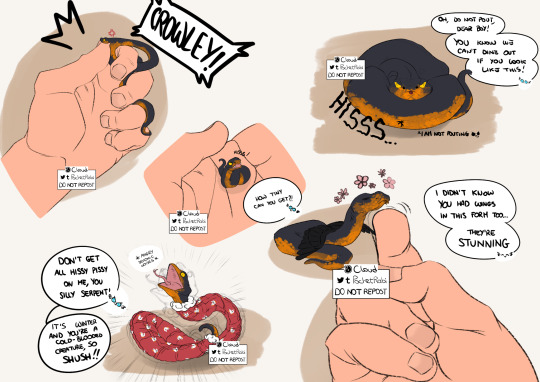
797 notes
·
View notes
Text
"We were supposed to have our own side..."

I'm thinking about making prints of this drawing 👀
6K notes
·
View notes
Text

first time drawing Aziraphale digitally!
121 notes
·
View notes
Text
Aziraphale Of The Day: he invented silliness

911 notes
·
View notes
Text
I'm having some thoughts about the meaning within the ox rib scene in Good Omens season 2, and the whole Job minisode and what it means for their relationship.
It is the first time Aziraphale consumes human food, importantly, tempted by Crowley. And - stay with me for a second - I think this is symbolically the first time they consummate their relationship, which is thus forever changed.
There's, of course, the obvious hedonism of Aziraphale in this scene, where he's absolutely going to town on that ox and discovering carnal desire for the first time. It is reminiscent of the feeling of discovering what true desire feels like when you let yourself lean into it for the first time.
I think it's significant that they're ox ribs, of all things. Ribs are literally involved in the creation of human life in the bible. A fact we're reminded of multiple times in this episode.
After Aziraphale really goes to town on the ox ribs - which both he and Crowley thoroughly enjoy - they use the ribs in (re)creating life together. Job's children are (re)born from those very ribs that Crowley and Aziraphale enjoyed together.
You can view the ox rib scene sexually or not, but there's a clear connection between their physical desire and acting on that desire with the later childbirth scene.
It was in this whole experience that they both saw much more deeply into each other and were vulnerable with each other. They realize they're both more similar to each other than they fully knew before and that they can trust each other.
It's here that they really became a group of the two of them, a couple, on their own sides, but together.
118 notes
·
View notes
Text
it is so sweet how the bookshop is crowley's safe place, not only because no other demon can get in, and the angels are never there, but also because crowley likes it. he feels comfortable there,

he has this sense of protection and caring for it,

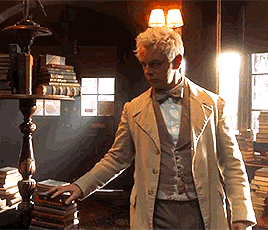
and the bookshop holds good memories for him


3K notes
·
View notes
Text

historians will they they were partners in magic!
2K notes
·
View notes
Text
youtube
So I was watching this old video again because the new Good Omens season triggered my obsession with Neil Gaiman's stories that creeps up periodically ( and his voice is soothing to listen to while I draw) And at about 1:25:30 there's a part that really made me giggle, cause this is what he says when asked about themes in his work:
"I remember once somebody asked me about the kiss that would occur in my books three quarters of the way through, to indicate that we were now moving into act three. And I said 'what'. And they said 'well you must be conscious of it, you do it every time.'"
And I mean...
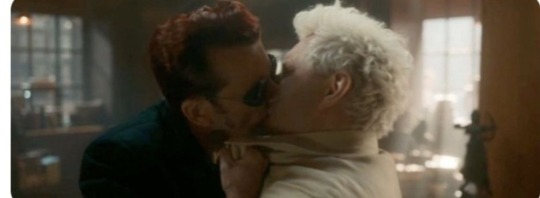
30K notes
·
View notes
Text
have an ox rib 😏😁 <— clueless voice of a demon about to create his own greatest temptation
2K notes
·
View notes
Text
The good omens confession/divorce is still so insane to me.
They're both saying "I love you, I need you, please come with me" and somehow they both walk away from that conversation feeling completely and utterly rejected.... absolutely amazing lmao
418 notes
·
View notes
Note
neil babygirl how does aziraphale take his crepes
...orally?
19K notes
·
View notes
Text

I've never tried posting my art on here. Should I make this a thing?
3K notes
·
View notes
Text
Awhile ago @ouidamforeman made this post:
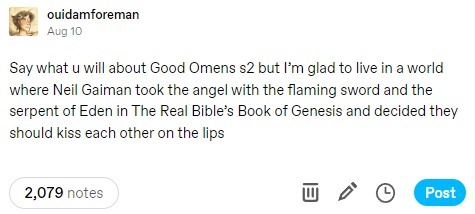
This shot through my brain like a chain of firecrackers, so, without derailing the original post, I have some THOUGHTS to add about why this concept is not only hilarious (because it is), but also...
It. It kind of fucks. Severely.
And in a delightfully Pratchett-y way, I'd dare to suggest.
I'll explain:
As inferred above, both Crowley AND Aziraphale have canonical Biblical counterparts. Not by name, no, but by function.
Crowley, of course, is the serpent of Eden.
(note on the serpent of Eden: In Genesis 3:1-15, at least, the serpent is not identified as anything other than a serpent, albeit one that can talk. Later, it will be variously interpreted as a traitorous agent of Hell, as a demon, as a guise of Satan himself, etc. In Good Omens --as a slinky ginger who walks funny)
Lesser known, at least so far as I can tell, is the flaming sword. It, too, appears in Genesis 3, in the very last line:
"So he drove out the man; and placed at the east of the garden of Eden Cherubims, and a flaming sword which turned every way, to keep the way of the tree of life." --Genesis 3:24, KJV
Thanks to translation ambiguity, there is some debate concerning the nature of the flaming sword --is it a divine weapon given unto one of the Cherubim (if so, why only one)? Or is it an independent entity, which takes the form of a sword (as other angelic beings take the form of wheels and such)? For our purposes, I don't think the distinction matters. The guard at the gate of Eden, whether an angel wielding the sword or an angel who IS the sword, is Aziraphale.
(note on the flaming sword: in some traditions --Eastern Orthodox, for example-- it is held that upon Christ's death and resurrection, the flaming sword gave up it's post and vanished from Eden for good. By these sensibilities, the removal of the sword signifies the redemption and salvation of man.
...Put a pin in that. We're coming back to it.)
So, we have our pair. The Serpent and the Sword, introduced at the beginning and the end (ha) of the very same chapter of Genesis.
But here's the important bit, the bit that's not immediately obvious, the bit that nonetheless encapsulates one of the central themes, if not THE central theme, of Good Omens:
The Sword was never intended to guard Eden while Adam and Eve were still in it.
Do you understand?
The Sword's function was never to protect them. It doesn't even appear until after they've already fallen. No... it was to usher Adam and Eve from the garden, and then keep them out. It was a threat. It was a punishment.
The flaming sword was given to be used against them.
So. Again. We have our pair. The Serpent and the Sword: the inception and the consequence of original sin, personified. They are the one-two punch that launches mankind from paradise, after Hell lures it to destruction and Heaven condemns it for being destroyed. Which is to say that despite being, supposedly, hereditary enemies on two different sides of a celestial cold war, they are actually unified by one purpose, one pivotal role to play in the Divine Plan: completely fucking humanity over.
That's how it's supposed to go. It is written.
...But, in Good Omens, they're not just the Serpent and the Sword.
They're Crowley and Aziraphale.
(author begins to go insane from emotion under the cut)
In Good Omens, humanity is handed it's salvation (pin!) scarcely half an hour after losing it. Instead of looming over God's empty garden, the sword protects a very sad, very scared and very pregnant girl. And no, not because a blameless martyr suffered and died for the privilege, either.
It was just that she'd had such a bad day. And there were vicious animals out there. And Aziraphale worried she would be cold.
...I need to impress upon you how much this is NOT just a matter of being careless with company property. With this one act of kindness, Aziraphale is undermining the whole entire POINT of the expulsion from Eden. God Herself confronts him about it, and he lies. To God.
And the Serpent--
(Crowley, that is, who wonders what's so bad about knowing the difference between good and evil anyway; who thinks that maybe he did a GOOD thing when he tempted Eve with the apple; who objects that God is over-reacting to a first offense; who knows what it is to fall but not what it is to be comforted after the fact...)
--just goes ahead and falls in love with him about it.
As for Crowley --I barely need to explain him, right? People have been making the 'didn't the serpent actually do us a solid?' argument for centuries. But if I'm going to quote one of them, it may as well be the one Neil Gaiman wrote ficlet about:
"If the account given in Genesis is really true, ought we not, after all, to thank this serpent? He was the first schoolmaster, the first advocate of learning, the first enemy of ignorance, the first to whisper in human ears the sacred word liberty, the creator of ambition, the author of modesty, of inquiry, of doubt, of investigation, of progress and of civilization." --Robert G. Ingersoll
The first to ask questions.
Even beyond flattering literary interpretation, we know that Crowley is, so often, discreetly running damage control on the machinations of Heaven and Hell. When he can get away with it. Occasionally, when he can't (1827).
And Aziraphale loves him for it, too. Loves him back.
And so this romance plays out over millennia, where they fall in love with each other but also the world, because of each other and because of the world. But it begins in Eden. Where, instead of acting as the first Earthly example of Divine/Diabolical collusion and callousness--
(other examples --the flood; the bet with Satan; the back channels; the exchange of Holy Water and Hellfire; and on and on...)
--they refuse. Without even necessarily knowing they're doing it, they just refuse. Refuse to trivialize human life, and refuse to hate each other.
To write a story about the Serpent and the Sword falling in love is to write a story about transgression.
Not just in the sense that they are a demon and an angel, and it's ~forbidden. That's part of it, yeah, but the greater part of it is that they are THIS demon and angel, in particular. From The Real Bible's Book of Genesis, in the chapter where man falls.
It's the sort of thing you write and laugh. And then you look at it. And you think. And then you frown, and you sit up a little straighter. And you think.
And then you keep writing.
And what emerges hits you like a goddamn truck.
(...A lot of Pratchett reads that way. I believe Gaiman when he says Pratchett would have been happy with the romance, by the way. I really really do).
It's a story about transgression, about love as transgression. They break the rules by loving each other, by loving creation, and by rejecting the hatred and hypocrisy that would have triangulated them as a unified blow against humanity, before humanity had even really got started. And yeah, hell, it's a queer romance too, just to really drive the point home (oh, that!!! THAT!!!)
...I could spend a long time wildly gesturing at this and never be satisfied. Instead of watching me do that (I'll spare you), please look at this gif:
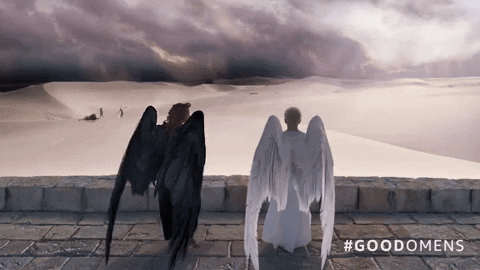
I love this shot so much.
Look at Eve and Crowley moving, at the same time in the same direction, towards their respective wielders of the flaming sword. Adam reaches out and takes her hand; Aziraphale reaches out and covers him with a wing.
You know what a shot like that establishes? Likeness. Commonality. Kinship.
"Our side" was never just Crowley and Aziraphale. Crowley says as much at the end of season 1 ("--all of us against all of them."). From the beginning, "our side" was Crowley, Aziraphale, and every single human being. Lately that's around 8 billion, but once upon a time it was just two other people. Another couple. The primeval mother and father.
But Adam and Eve die, eventually. Humanity grows without them. It's Crowley and Aziraphale who remain, and who protect it. Who...oversee it's upbringing.
Godfathers. Sort of.
27K notes
·
View notes
Text
thinking about how annoyed crowley is with jimbriel the whole season and yet when hes curious about gravity crowley just. explains it. jim asks ‘why’ and crowley doesn’t act annoyed at all and actually tries to remember. and then he answers honestly when he’s not sure. thinkin about that a whole lot
5K notes
·
View notes



